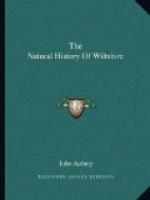In the parish of....... is a spring dedicated to St. Winifred, formerly of great account for its soveraigne vertues. What they were I cannot learne; neither can I thinke the spring to be of less vertue now than in the time of Harry the Eight; in which age I am informed it was of great esteeme: and I am apt to conjecture that the reason why the spring grew out of fame was because S*. Winifred grew out of favour. ___________________________________
At the Devizes, on the north side of the castle, there
is a rivulet of water which doth petrifie leafes,
sticks, plants, and other things that grow by it;
which doth seem to prove that stones grow not by apposition
only, as the Aristotelians assert, but by susception
also; for if the stick did not suscept some vertue
by which it is transmuted we may admire what doth
become of the matter of the stick
___________________________________
At Knahill [Knoyle] is a minerall water, which Dr.
Toop and Dr. Chamberlayn have tryed. It is neer
Mr. Willoughby’s house: it workes very
kindly, and without any gripeing; it hath been used
ever since about 1672.
___________________________________
Dr. Guydot sayes the white sediment in the water of
North Wiltshire is powder of freestone; and he also
tells me that there is a medicinall well in the street
at Box, near Bathe, which hath been used ever since
about 1670.
___________________________________
Mr. Nich. Mercator told me that water may be
found by a divining rod
made of willowe; whiche he hath read somewhere; he
thinks in
Vitruvius. Quaere Sir John Hoskins de hoc.
___________________________________
In Poulshott parish the spring was first taken notice of about thirty yeares since by S. Pierse, M.D. of Bathe, and some few made use of it Some of the Devises, who dranke thereof, told me that it does good for the spleen, &c., and that a hectick and emaciated person, by drinking this water, did in the space of three weekes encrease in flesh, and gott a quick appetite.
Memorandum. In this village are severall springs,
which tast brackish; which I had not the leisure to
try, but onely by præcipitation, and they yield a
great quantity of the white flower-like sediment.
___________________________________
Bitteston.- At the George Inne, the beere that is brewed of the well there is diuretique. I knew some that were troubled with the stone and gravell goe often thither for that reason. The woman of the house was very much troubled with fitts of the mother; and having lived here but a quarter of a yeare, found herself much mended; as also her mother, troubled with the same disease. I observed in the bottome of the well deep blew marle.
[The hysterical paroxysms to which females are peculiarly
subject were in Aubrey’s time commonly termed
“the mother”, or “fits of the mother”.
Dr. Edward Jorden published a “Discourse on the
Suffocation of the Mother”, (4to.) in 1603.-
J. B.]
___________________________________




